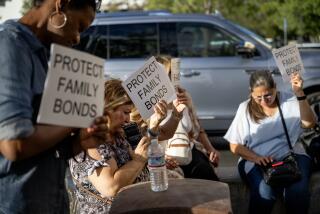Hebron: Reconcile, as of Old
- Share via
Once again, Israelis and Palestinians--Jews and Muslims, that is--are clashing in the West Bank city of Hebron. Most recently, a member of an extreme nationalist Jewish group distributed flyers depicting the prophet Muhammad as a pig. Despite the formal agreement redeploying Israeli troops and handing most of Hebron to the Palestinians, nothing approaching tolerable coexistence, let alone peace, has come to the city where the patriarchs Abraham, Isaac and Jacob and three of the matriarchs are buried.
Hebron is an Arab city, say Muslim Palestinians; the Jews have no business being there.
Hebron is a holy biblical Jewish site, say militant Jews; God gave it to us, and it is a cornerstone of our eternal patrimony.
Thus, both Jews and Muslims have drawn their respective lines in the sand.
As is usually the case with zealots, both sides are also wrong, even by the most basic religious standards. While I cannot speak as an authority on the Koran, it is clear from the Book of Genesis that as a matter of Jewish religious principle, Hebron should be the focal point of Israeli-Palestinian and Jewish-Muslim reconciliation and coexistence rather than hatred.
Jewish faith is based on the premise that the Torah, the five books of Moses, are, if not written by God, divinely inspired in their entirety. Not a single word is superfluous and no phrase is without significance.
Accordingly, militant Jews should bear in mind that while God may have promised the land of Israel to the Jewish people, when Abraham needed a burial site for his wife, Sarah, he purchased the Cave of Machpelah in Hebron together with the field on which it is located from Ephron the Hittite in the first recorded real estate transaction in history. According to the text, Ephron at first refused to accept any money for the cave from Abraham and wanted to give it to him. Telling the Hittites that “I am a resident alien among you,” Abraham insisted on buying the cave at its full price. Ultimately, Ephron agreed to Abraham’s terms.
Not only does the Bible emphasize, that a local--obviously non-Jewish--population preceded Abraham and his descendants in Hebron, but it underscores that the rights of this population were explicitly recognized. Had Abraham believed himself to have a divine right to the entire land, he would have accepted Ephron’s gift of the cave. After all, why pay full price for something that you know--or believe--belongs to you?
More important, Abraham declares his willingness to live in peace among the local population. He is the outsider among them, he acknowledges, and he wants to bury his wife in a way that would not offend them.
Only a few verses later in Genesis, Hebron is the site of the first Arab-Jewish reconciliation. Even though Abraham had banished his oldest son, Ishmael, after Isaac’s birth, Ishmael reappears on the scene in Hebron after Abraham’s death to join Isaac in burying their father. According to the text, “His sons Isaac and Ishmael buried him in the Cave of Machpelah in the field of Ephron son of Zohar the Hittite, facing Mamre, the field that Abraham had bought from the Hittites.”
Does not Isaac and Ishmael’s reconciliation mandate their descendants to reconcile as well, especially in Hebron? And why does the text reiterate that Abraham had purchased his burial place from Ephron the Hittite other than to emphasize that it was situated in the midst of a population that had to be respected?
Indeed, it is also significant that God blessed Isaac only after he and Ishmael had reconciled, at least to the extent of being able to pay joint tribute to their father. Can one not infer that this reconciliation was a prerequisite for God’s blessing? And if that is the case, couldn’t it also be inferred that from a religious perspective, Palestinian-Israeli reconciliation and coexistence--the success of the peace process--is a prerequisite to God’s bestowing his blessing today on Isaac’s and Ishmael’s descendants?
With the fragile Middle East peace process in dire jeopardy, a nontraditional approach may be in order. If political pragmatism has run its course, at least for the time being, a moral, religious basis for Arab-Jewish coexistence may be the region’s last viable hope. Now all Israelis and Palestinians need are religious leaders prepared to embrace peace rather than foment hatred.
More to Read
Sign up for Essential California
The most important California stories and recommendations in your inbox every morning.
You may occasionally receive promotional content from the Los Angeles Times.












